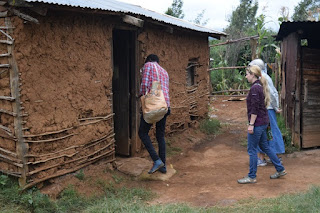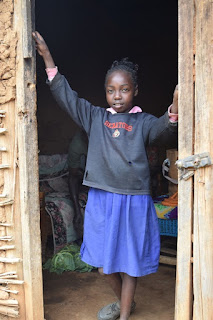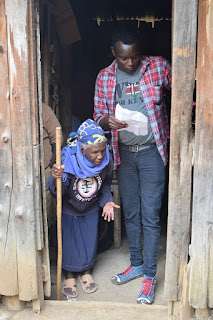“… the people immediately recognized Him and ran about
the whole region
and began to bring the sick people on their beds to
wherever they heard He was.”
Mark 6:55
OPD (Outpatient Department) is a fascinating place.
Patients come from all over East Africa; many are local,
from Kiambu and Nakuru Counties, but others come from western Kenya near Lake
Victoria, some from eastern Kenya near Somalia or along the coast, and some with
the means to travel even come from other countries in East Africa, such as
Ethiopia, Somalia, Rwanda, Burundi, and Congo.
Many travel for hours or overnight in order to see a doctor at Kijabe Hospital. They have heard about the quality of care here; it’s often better than what they can expect at a government facility or even some of the private hospitals in the cities.

Most come by matatu. Matatus are small tightly-packed 14-seat vans that
are the basic public transportation in Kenya. When we say “the bus came in”,
it’s literally the case here! Others arrive riding on the back of a piki (motorcycle), and a few have their own cars.
It costs 500 Kenya shillings (about $5) for a new patient in
OPD, and 300KSh for a return patient. A small fee by our standards, and affordable
for some East Africans, but a large amount for the majority of Kenyan farmers and laborers, so
they don’t come unless they are quite ill. There is also the Private Clinic,
where one can pay a bit extra to see a doctor while avoiding the crowd. I staff
the Private Clinic one day per week.
OPD is all walk in, first come first served. After paying
their fee and being screened by the triage nurse, patients wait on benches to
be called. The very sick are sent next door to Casualty (our ER). Most patients
will be seen by a resident MD or by one of our Clinical Officers (like PA’s), who do an excellent job
evaluating and treating patients – I’m impressed with how competent they are.
Along
with another senior MD, I serve as a consultant for the 6 or 8 CO’s working
each day, and I may also see a few patients who can speak Kiingereza (English).
OPD can be a noisy, congested place, with people going every which
way. The rooms are small, often cold, and minimally equipped. Jonathan and his crew orchestrate
who is going where, and somehow it all fits together. When we order a lab test,
Xray, or CT, the patient sees the cashier to pay for it, then goes to get the
test done – everything is prepaid in Kenya.
When the results are back, the
patient comes back to us for review. We actually have a PACS system for viewing
Xrays, doing our own interpretations. CT’s are transmitted to a radiologist in
Kisumu, a city on the edge of Lake Victoria, and we get a report back in about
an hour. Ultrasounds are interpreted by the tech, who gives us a typed report.
When the visit is over, patients head off to the cashier to
pay for their medicine, pick it up at the pharmacy, and head up the hill to the
matatu stop.

Start to finish, a visit to OPD can consume the entire day. We
feel some pressure to tie things up for a patient, as many of them have
travelled hours and many kilometers to get here, and the matatus leave by late
afternoon. We can’t just say come back tomorrow for your test results. But getting
it all tied up is not always easy to do, so we sometimes compromise, doing as
much as we can in a day, prescribing a trial of treatment, and advising them to
return in a week or two.
We have some specialties available here, such as GYN,
surgery, ENT, and ortho, and a few Kenyan specialists such as a cardiologist
and an oncologist who come to Kijabe once a week. MRI’s can be scheduled at
various facilities in Nairobi. A state-of-the-art MRI costs around 15,000KSh
(about $150), quite cheap compared to U.S. prices, but still expensive for most
Kenyans, so sometimes we must do without.
A few patients I saw last week:
A 36 year old woman came with her husband from Kakamega,
several hours away near the Ugandan border. She found a breast lump recently,
and had a biopsy report in hand, including hormone receptor status. She was
seeking a second opinion. After reviewing everything, I walked over to talk
with Peter Bird, one of our surgeons, and he agreed to see her right away. She
will probably need a lumpectomy and chemotherapy.
A 50 year old Muslim man from Nairobi suffered a fractured tibia when he was hit by a piki about 5 months ago. He was initially treated in Nairobi with a plaster cast, which was replaced 2 months later. Now the plaster was soft and disintegrating, and his leg was still very painful; he couldn’t bear weight on it. An Xray confirmed a malunion. I had him see orthopedics, and he will return for surgery at a later date. Surgery will be expensive, but he will send texts to family and friends, and they will transmit funds to him via cellphone so he can pay for it.

A 60 year old man came with his wife from Nakuru, about 2
hours north of here. He had been seeing a cardiologist for hypertension, marked
edema, and shortness of breath, but was not improving. His chest Xray showed a
large heart with a pleural effusion, but most striking was his creatinine of
9.8, almost 10 times normal. He has renal failure, likely due to hypertensive
kidney disease, and needs dialysis. I asked around and found that there are
many more sites offering dialysis than there were in 2010, including his
district hospital in Nakuru. His wife will take him there.
A 78 year old Nandi man came with a group of about 8 family
members. The Nandi people are farmers and herdsmen from dry regions of northern
Kenya. He was in failing health, with worsening rib pain for several months. His
blood tests were pretty good, but his chest Xray was suspicious. They had funds
to pay for a chest CT, which confirmed my suspicion of multiple myeloma. He
will stay with his family in Nairobi and return to see the visiting oncologist
later in the week.
As a contrast, a 17 year old girl from a more affluent family in
Nairobi came in with her mother because of bunions in both feet. Most rural Kenyans
wear old flipflops or go barefoot (and have very few foot problems), but this
girl had been wearing tight, fashionable shoes for too long, and her feet were
showing it at a very early age. Western afflictions are becoming more common in
Kenya!
- Doug



































































